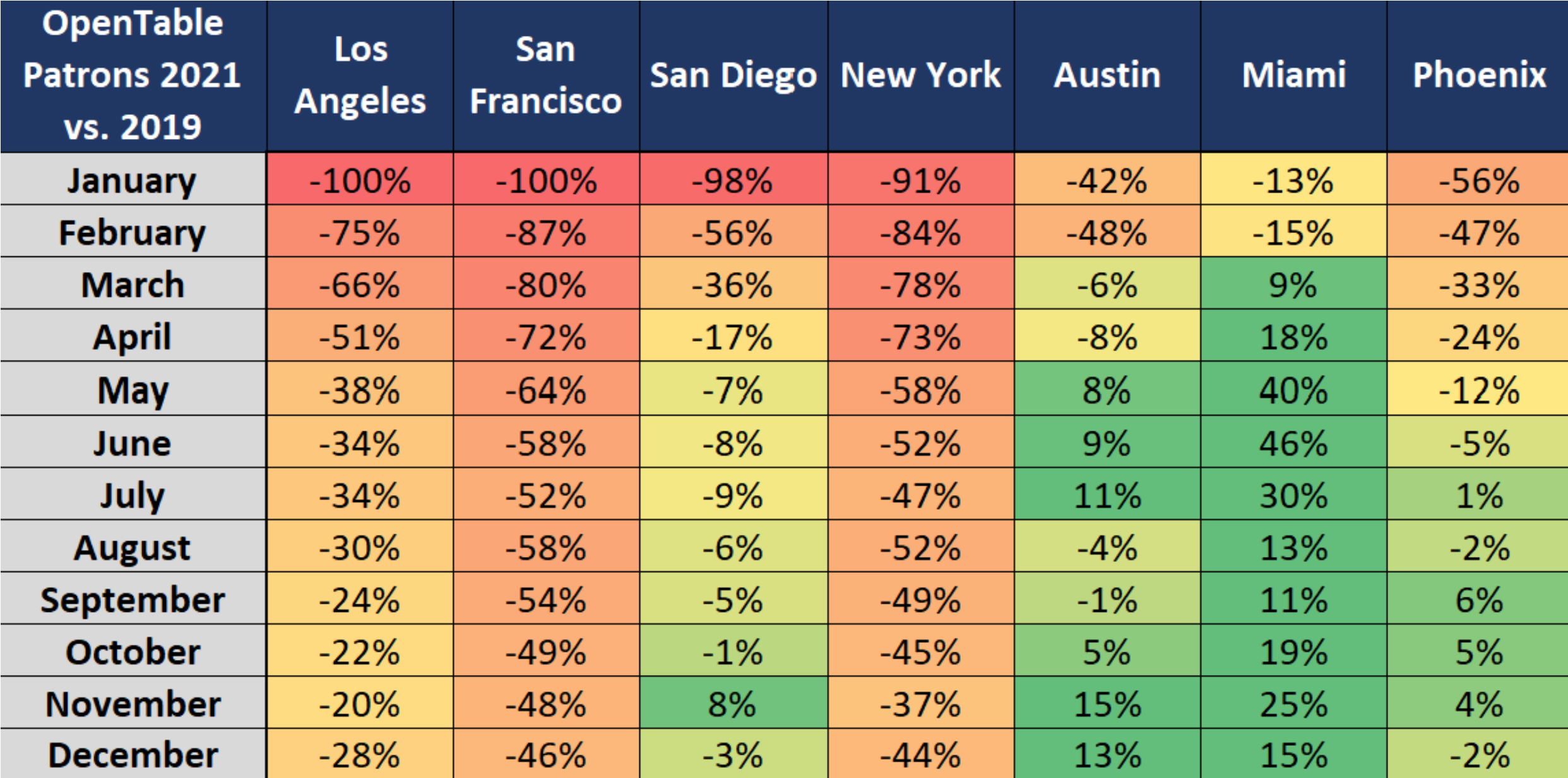Analysis: Data Shows LA and SF Are Hurting Their Restaurants Through COVID Restrictions
Over the past few months, Los Angeles and San Francisco have continued to make it hard for restaurants to return back to normal in the wake of the ongoing COVID-19 pandemic. Both cities brought back mask mandates only a couple of months after California “reopened” last June. They also instituted rules requiring certain businesses, including restaurants, to confirm a customer’s proof of vaccination before allowing them to enter their establishment.
Data from OpenTable, the popular restaurant reservation app, shows that these mandates have resulted in Los Angeles and San Francisco restaurants losing nearly a quarter and almost half of their customers respectively, while restaurants in cities without such measures have returned to or even surpassed their pre-pandemic numbers.
OpenTable has been tracking the restaurant industry since the beginning of the pandemic. Using their dataset, we can determine whether restaurants in particular cities have returned back to their “normal” pre-pandemic customer reservation rates or if they are still lagging behind.
An analysis run by California Policy Center, shown below, compares restaurant reservations from a particular time in 2021 to the same date in 2019. A value of 0% means that the restaurant industry in the city has the same number of patrons at this point in 2021 as they did in 2019. A value of -20% means that the restaurant industry in the city has 20% less patrons at this point in 2021 as they did in 2019. Instead of looking at 365 data points, we chose the median value for every given month for a given city from the OpenTable dataset to remove the chance of outlier events.
We looked closely at three California cities: Los Angeles, San Francisco, and San Diego. San Diego was included because, while all three cities had to deal with statewide COVID restrictions early in 2021, San Diego did not have the same level of restrictions in the latter part of 2021 when compared to San Francisco and Los Angeles. San Diego did not bring back its mask mandate until December and they currently don’t have a vaccine verification requirement to enter restaurants. We also wanted to compare them to other cities like New York, which has similar restrictions to Los Angeles and San Francisco, as well as cities with no mask or vaccine verification mandates, including Austin, Miami, and Phoenix. You can find our analysis for all U.S. cities HERE.

Looking at the data, a pattern clearly emerges. Cities with the heaviest COVID restrictions, including Los Angeles, San Francisco, and New York, are still far from returning to their pre-pandemic customer numbers. As of December 2021, Los Angeles had 28% less patrons in their restaurants compared to December 2019. San Francisco had 46% less patrons, and New York had 44% less. These cities have been experiencing these devastatingly low numbers throughout 2021.
But how about San Diego? After the tough statewide restrictions early in 2021, San Diego had over 90% of their 2019 patrons back by May 2021. By November 2021, San Diego had 8.4% more patrons than they had in November 2019. In comparison, Phoenix’s restaurant industry returned to normal customer rates during Summer 2021 and Miami returned to normal back in March 2021.
One might contend that the patrons in “blue” cities may be more cautious and hesitant about returning to restaurants, especially when compared to relatively more moderate cities like Phoenix, Miami, and San Diego. The data from Austin, Texas, however, shows this is not the case.
Austin voted similarly to Los Angeles in 2020 (both had 71% of county residents vote for Biden), but their restaurant industry, free from COVID restrictions, returned to pre-pandemic numbers back in May 2021.
Los Angeles and San Francisco should have seen this coming. A survey by the National Restaurant Association back in Summer 2021 found that 1 in 3 Americans reported that they would not go to a restaurant if they were forced to prove COVID-19 vaccination.
And while others might argue that tighter COVID restrictions remain necessary as the Omicron variant continues to surge in the United States, experience over the last several months shows that making restaurant owners into the vaccine police doesn’t work. Despite politicians like Mayor Garcetti asserting that vaccine mandates would make businesses safer for workers and customers, the fact is that mandates are difficult to enforce and the latest data shows that the vaccines are not as effective against Omicron compared to the Delta variant.
Moreover, a study conducted just prior to the Omicron wave found that in order for a vaccine mandate to work, at least 1,000 unvaccinated people have to be excluded from a particular setting to prevent a single additional COVID-19 transmission. The authors of the study concluded that “excluding unvaccinated people has negligible benefits for reducing transmissions.” And now, with the Omicron surge infecting the vaccinated more often than before, the argument for a vaccine mandate has become meaningless.
The proof is in the data. In fact, Los Angeles currently has the most COVID cases per capita of any county in California, while San Francisco is ranked tenth (as of January 17, 2022), even though both cities have some of the highest vaccination rates in the country and have the strictest restrictions.
California’s world-class restaurant industry has suffered immensely over the last two years due to strict COVID restrictions and regulations. City officials in Los Angeles and San Francisco cannot afford to continue to compel businesses to enforce unnecessary COVID restrictions when the data shows otherwise. It’s time for L.A. and San Francisco to allow restaurants to get back to normal.
***
Brandon Ristoff is a policy analyst for the California Policy Center.
